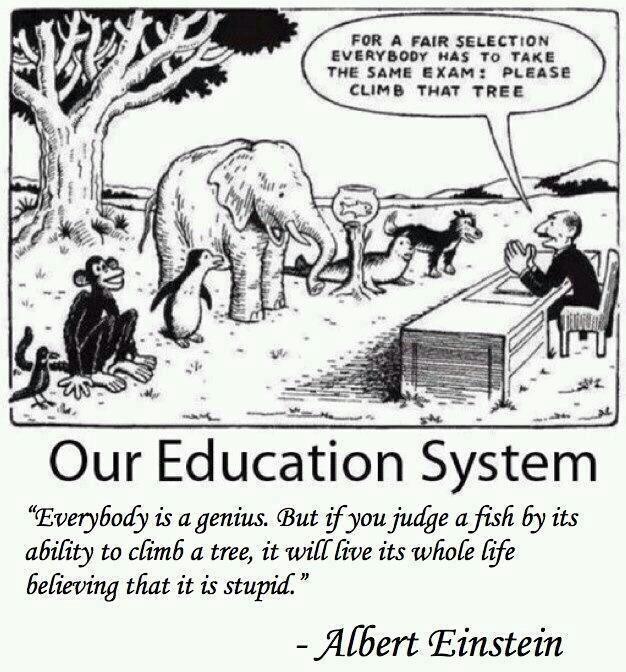
It is obviously very easy to shout from the sidelines that our current education system is, to put it at its mildest, seriously flawed. Therefore I will describe in detail why I absolutely believe this to be the case.
But first of all I wish to make it clear that I have no quarrel with-, and mean no disrespect for individual, passionate, dedicated members of the education realm. It would be wrong of me to express any contention towards any individual who wishes to devote their lives to helping students grow as a person and reach their full potential. It is not these individuals my antagonism is targeting. It is the system they are bound to work in which piques my discontent.
Schools kill creativity
"All children are born as artists, the problem is to remain an artist as we grow up." ~ Picasso
In 2006, Sir Ken Robinson, a British author and international advisor on education, held a moving, must-see TED talk which has been viewed by millions on how schools kill creativity. The primary way schools go about killing creativity is by punishing children for making mistakes, while failure is the prerequisite to learning and creativity. In Robinson's words: "Being wrong is not the same thing as being creative, but if you are not prepared to be wrong, you will never come up with something original." It is important to note that creativity is more than artistic creativity; it is the ability to transcend traditional ideas and create innovative solutions by using one's imagination. I once heard the term "bulimic system" being used to describe the way we stuff our students with facts, which they then have to puke out on a test at a later date. This highly ineffective system is nothing more than a memory test and leaves no room at all for creative thinking. The dreadful result is that at the end of their education all kids, young adults by then, are afraid of being wrong, because they have been taught that there is nothing worse than making mistakes. Our children start primary school as young artists and leave university as imaginationless sheep.
Everyone always says that you learn from your mistakes, and while this is absolutely true, our tests are designed in such a way that you have to memorize a thick book filled with facts, then regurgitate those facts on a test, and three weeks later receive a grade back. All this grade tells us is how many mistakes we made, or how well we memorized the book, but it does not tell us which mistakes we made and how we could have avoided them. In other words, no learning takes place. Sure, you are often allowed to review your graded tests to see what went wrong, but three weeks after the test you hardly remember what the name of the course was, let alone learn from the mistakes you have made on the test. Learning from mistakes only occurs when there is direct feedback through trial and error. Tests should not have a right answer which the student has memorized, instead students must be stimulated to use their creativity, their intelligence, to "find out" the right answer and receive immediate feedback during their efforts to see if they are on the right track.
This creative learning process of trial and error has much in common with programming. Let's say a programmer gets an assignment, e.g. combine these two data sources and create a fancy graph out of it. There is no predefined way for him to complete this task, or, as the saying goes, all roads lead to Rome. Our programmer has to its disposal a programming language which offers him a set of basic functionalities, for example a function to retrieve data and a function to output that data on a blank web page. He will have to come up with a creative way to combine several basic functions to create the desired result, a fancy graph in this case. He will most likely not get it right the first try and will encounter many of so called bugs in his code which he will have to fix in order to make things work as intended. These bugs, and the error messages they produce, provide valuable feedback on what could be wrong. He goes online to see how other people approached similar problems -- every professional programmer looks things up all the time -- and he tries again. This process repeats itself until he gets the code to work without hiccups. Don't you think our programmer learned more from this trial and error search for answers than he would have if all he had to do was copy and paste a pre-written piece of code to make everything work flawlessly? While a programmer has no choice but to use trial and error because every assignment is unique, our schools do have a choice. Yet, the copy/paste approach is essentially how we run our tests today; copy from a book to your temporary memory, then paste on the test, et voilá! No creativity required.
Besides the flawed way of testing the intelligence (read: memory) of our children, we also approach education as mass-production instead of recognizing and valuing that every person is unique. For example, every education system around the world views art, music and drama classes, the creative classes, as a trivial part of their curriculum, and emphasize the importance of math and languages. I am not here to dismiss math and languages as unimportant, on the contrary, but do we really need 6 billion mathematicians? No! Some people are born dancers or artists, but we punch that out of them with arguments that they will never be able to earn a living doing that. Robinson says that "a lot of highly talented, brilliant people think they are not, because what they are good at is not valued at school, or actually stigmatized." We put an ADHD label on them and get them to sit still and obey the rules of the education game, leaving them feeling absolutely miserable and inadequate. I can't dance and no one bats an eye, but if you can't calculate x everybody loses their mind! I am well aware that in an industrialized society a dancer or a painter adds less economic value than an engineer, but trying to fit a square person in a round hole is a poor solution which creates more misery than benefits. A more sophisticated system is needed which nurtures every person's unique strengths instead of the one-size-fits-all methodology of the present curriculums.

Schools teach the truth
"Convictions are a greater enemy of truth than lies." ~ Nietzsche
In today's fast-paced world, new knowledge is generated at such an alarming rate that nearly everything you learned during your studies will be completely outdated by the time you graduate. In fact, chances are that when the book you learnt all of that incredible knowledge from got to print, the information contained in that book was already outdated. The danger of giving students a 1400 page book which claims to contain everything we know on a certain subject, is that we lock each new generation of thinkers into old paradigms. By teaching them preconceived notions of truth we kill off revolutionary ideas by their roots, because every student will start its career from the same frame of reference. They will all be thinking inside the same box. Now imagine that what we taught them turns out to be wrong..
A painful example of this is cancer research. We believe, and therefore we teach, that cancer is a genetic disease. To quote Travis Christofferson, founder of Single Cause Single Cure: "The Somatic Mutation Theory of Cancer is to cancer researchers what gravity is to physicists — It is scientific dogma, it is learned early by all students and never questioned again." This is why billions upon billions have been invested into research in that direction ever since Nixon declared the war on cancer in 1971, yet we do not seem to be winning the battle. This year alone approximately 600.000 Americans will die from this killer disease. Christofferson is promoting a radically different theory and believes that cancer is caused, and can therefore be fought, by changes to our diet. While this theory needs to be researched more in depth, early studies with so called ketogenic diets show very promising results. Put simply, ketogenic diets starve cancer cells by drastically reducing their main source of energy: carbohydrates.
“What do you think would happen if all the resources dedicated to the genetics of cancer were redirected to the metabolism of cancer?” Christofferson once asked Dr. Seyfried, a cancer researcher from Boston College and author of the provocative book Cancer as a Metabolic Disease, “Ten years. I bet we could have real cures in 10 years if that were to happen”, was the reply. The fact that we may have wasted 40 years, hundreds of billions and, most importantly, countless innocent lives, goes to show how destructive our dogmatic way of teaching can be. Grand theories like gravity and the Somatic Mutation Theory of cancer are vital in furthering our understanding of these fields, even when they later turn out to be imperfect, but presenting them to students as the one and only truth is a dangerous thing to do, because it stops innovation dead in its tracks.
Being convinced something is true does not make it true. We should accept that we do not know everything and that the things we do know may be wrong. Teaching our children facts is therefore both dangerous, because these facts might turn out to be wrong, and uneconomical, because we have Google and Wikipedia to find on-demand, up-to-date information on every possible subject. So instead of teaching our children the truth as it is written in a certain book, teach them to think on their own. Stimulate them to ask interesting questions beyond what is currently known. Don't lock them into old ways of thinking and inspire their curiosity instead. Teach them to have an open mind by showing them conflicting theories to let them find out their own truth, because, according to F. Scott Fitzgerald, "the test of a first-rate intelligence is the ability to hold two opposing ideas in mind at the same time and still retain the ability to function."
Schools do not prepare children for life
"Life is 10% what happens to you and 90% how you react to it." ~ Charles Swindoll
Schools prepare our children for a job, while it should prepare our children for living life. Important issues our children will face in their future are completely neglected during their education, leaving them to figure it all out on their own, often with disastrous consequences. The fact that 10% of middle-aged Europeans are on antidepressants might very well be caused by this failure of our education system to prepare people for dealing with everyday life.
Take for example money, relationships, and raising a child, to name just a few very common stress factors. We do not learn anything about these things at school, at least nothing practical. Sure, middle school covers basic economics, but it does not teach an individual how to handle the money they will earn later in life in a smart way. The result is catastrophic! All we know about money is that we have to earn it and then spend it, but not how we can earn it, besides getting a job, or what to spend it on. This way many people end up getting trapped in a disappointing job and struggle financially all their lives, simply because they are never taught how money works. We do not learn the basic difference between assets and liabilities, and this causes many of the financial problems people bump into.
I find it a highly disturbing fact that some of these individuals, which lack a proper financial education, will rise to positions of significant influence, be it at a large corporation or in the government. This might explain some of the excruciating financial decisions we read about in the newspapers on a daily basis. Some will argue that not schools, but parents should teach their children how to handle their money. However, how can we expect parents to teach their children something which they have never learnt themselves? Even more disturbing is the fact that many people are absolutely clueless as to how to raise a child, myself included. I would literally have no idea how to change a diaper or even what to feed my child if I were to have one today. Sure, new parents eventually learn by doing, but a child should not be some experiment in parenting. I am convinced that many childhood traumas and disastrous upbringings can be prevented with some basic parenting lessons.
Schools are stuck in the industrial age
“College is a place where a teachers lecture notes go straight to a students lecture notes without passing through the brains of either.” ~ Mark Twain
Our school system is mass producing standardized batches of graduates, as if it were a factory where each student is a product to which some value needs to be added before it can be sold for a profit. Sure, you can choose a direction to study, but you will still be in a class with hundreds of people. Do you really believe you are identical to all of them? I hope not. So why then do you all have to learn the exact same material at the exact same time? Not only do all students have their own personal passions and skills, but not every student learns at the same pace, or in the same way for that matter. In a class with hundreds of students, some will be bored to tears because it is too easy for them, while others are in tears because they struggle to keep up.
The result of having hundreds of students with identical degrees is that it makes it harder for them to distinguish themselves from their competitors on the job market. However, if all your peers have a Bachelor's degree, you could get an edge by getting a Master's degree. But if everybody does that, then only a PhD can provide an additional competitive advantage. This actually leads to a process called academic inflation; it commoditizes academic degrees and decreases their value. This means that many students have to overreach in order to try to get that higher degree, since their Bachelor's has become worthless in the job market. No wonder so many students -- some studies place it around 13 percent of all high school students -- reach out to so called "smart drugs" like Modafinil, Adderall, and Ritalin to be able to pass their exams at all. This obviously leads to health issues, but also to lower quality education in order to make sure that not too many students fail their exams, because who wants their children to attend a school where hardly anyone makes it to the end?
Also, there are incredibly high switching costs in the current system; once you have made the big decision to study a particular subject, you will lose significant time and money if you decide it is not really your cup of tea after all. To counter this, schools must, just like factories have, change from mass production to mass customization by using modern day technology to create highly personalized, constantly adaptable curriculums. I do not have anything against the one-to-many format of teaching, but while a lecture can work very well for a certain subject, like history, there might be a much better way of teaching a different subject, like math. There are countless of inspiring example of online educational tools which have developed a unique learning system for particular subjects, like Duolingo for languages and Codecademy for programming. Also, web sites like Coursera make high quality university courses available to the public free of charge. Other successful initiatives are the School of One and NoRedInk, which are pioneering a new method of education geared towards individual learning needs by providing students with their own personal learning environment. These wonderful initiatives create the rough outlines of an imminent and necessary revolution in education.
Schools produce university professors
“Knowledge is experience, otherwise it’s just information.” ~ Albert Einstein
If you take a hard look at our higher education system, the only conclusion you can draw is that it is essentially a 4 year traineeship for becoming a university professor. However, many of my friends have said to me at some point, and I share their sentiment, that they hope they will never ever have to do any academic research again for the rest of their lives, yet that is, ironically, exactly what university is preparing them for. And although I believe that the critical academic way of thinking universities teach is a valuable asset, it seems to me that 4 years is a bit of an overkill if that is the only result it achieves. What happens is that people with a Master's degree know very well how to do something which many of them do not want to do, academic research, but have exactly zero relevant work experience when they graduate. This makes it extremely difficult for them, especially during times of economic malaise, to find a job, because every business prefers people with practical experience over book worms, and rightfully so. It is actually quite paradoxical for companies to look for Master students with practical experience, because those two attributes do not naturally go together.
Some will argue that you should not attend university if practical experience is what you are aiming for, but that argument is a bit of a clincher. The fact of the matter is that many businesses look for highly educated workers, and university happens to be the highest form of education one can attend. This hierarchical system is bad for all parties involved, except for universities themselves for which it creates a huge pool of potential professors to choose from. However, this system makes it difficult for graduates to find a job which requires practical experience, which is nearly every job, and makes it difficult for businesses to find suitable candidates. Businesses took the initiative and have addressed this misalignment between theory and practice by offering traineeships and internships to bring applicants up to speed with how things work in the real world. These programs are now one of the most popular ways for graduates to land a job.
After doing an internship, many people say that they learnt more valuable lessons during those few short months than they learnt during their 4 years at university, and I wish I could tell you otherwise, but I have to fully agree with that observation. If, after 4 years of highly specialized education, someone still needs to learn nearly everything needed to succeed at a job during an internship, maybe we should consider substituting a chunk of the theory for some more practical lessons. This would not only benefit workers and businesses, but also makes sure professors gain some real world experience in the things they are planning to research, which could be a significant advantage for them.
Let's wrap this up with a hilarious quote from one of my favorite comedians, the legendary Louis CK:
"A 55 year old garbage man is a million times smarter than a 28-year old with 3 PhD's. Especially smarter than him. Because this idiot has been thinking about three things for like 15 years. He's worthless!"
Conclusion
Conversations with friends often inspire my own thoughts. I was having a coffee once, at least she was having a coffee while I had a beer, with a friend who is about to finish her first three years of university. She told me that she was struggling with what she wanted to do with her life after graduating. While I have heard many people say similar things, this particular time the significance of that statement hit me hard. Why? Because it struck me that what she was saying is that while she is nearing the end of her education, meaning that at least her career path is supposed to be somewhat determined, she is still absolutely clueless of what she really wants to do in life. This implies that the education system failed to help her determine a worthwhile goal to strive for in life. Her education failed to give her any direction whatsoever. And it is not just my friend; many people leave school with an overwhelming sense of rudderlessness.
What do you want to spend your time, energy, and attention on? Your most precious resources. This is an extremely difficult and highly personal question to answer, yet answering it is your only shot at long-term happiness. Holocaust survivor Viktor Frankl wrote that "what man actually needs is not a tensionless state, but rather the striving and struggling for a worthwhile goal, a freely chosen task. What he needs is not the discharge of tension at any cost but the call of a potential meaning waiting to be fulfilled by him." Having a clear goal in life you are passionate about, and someone to share your voyage with, is what ultimately makes for sustainable happiness, all the rest is merely noise and fleeting pleasure. Therefore I believe that helping children to find their passion early in life should be the primary objective of any education system. Everybody will have to find his or her own path through life, and an environment which aids in the discovery of this path will have a profound impact on the overall level of well-being in society.
We currently view our degree as a carte blanche to stop learning; it signifies that we are done learning and that we know everything we will ever need to know. Surely this is a flawed assumption. You should never stop learning and growing, so why can't our education system be more of a lifetime deal which guides us on our journey through life? A system you can fall back on in times of disorientation to help you get back on track, and which allows you to consistently grow as a person at your own pace. A system where teachers don't simply teach, but are more like mentors. A system which combines learning with passionately working towards one's personal, freely chosen goal. That is a system I would gladly expose my hypothetical children to.



